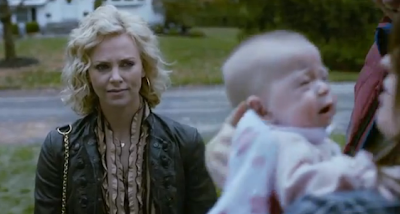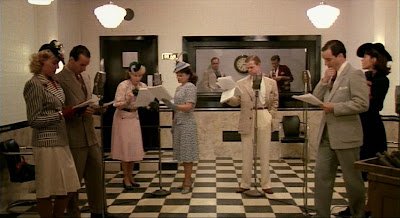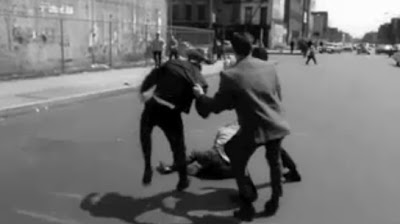Upon associating the name Diablo Cody and Young Adult Fiction together, the first things that come to mind are words like “yoseph” and phrases like “shut you freakin’ nard, Bard!”. I am not a “Juno” hater like many are, but phrases like these make being hip seem a little bit square. However, upon viewing her latest collaboration with director Jason Reitman, “Young Adult,” I found a writer who is starting to come into her own with her words, and a director who can bring those words to life.
Eight Nights of Hanukkah, Eight Nights of Movies: Night #3
Radio Days
“Annie Hall.” “Manhattan.” “Hannah and Her Sisters.” I could have gone with any of these timeless Woody Allen classics, so why did I choose “Radio Days”? It wasn’t an attempt to be original (“Annie Hall” is an easy choice, but it is a deserving one at that), but rather that “Radio Days” may just be the ultimate Jewish family comedy, and both a heartwarming and heartbreaking nostalgia trip.
Set during the 1930s and 40s, “Radio Days” is told in a series of vignettes that all connect back to the audio device that once ruled the world. Allen himself is never present onscreen, although he is the story’s narrator. A very young Seth Green is Allen’s stand-in onscreen under the name Joe. Joe obsesses over the radio so much that it starts to concern everyone in his family, especially his father (Michael Tucker). Joe is the youngest in a loud and rowdy household that includes an aunt and uncle and grandparents, as well as a family of Communists that live next door. His Uncle Abe (Josh Mostel, perhaps better known as Principal Anderson in “Billy Madison”) brings home a huge bag of fish everyday and eats them. Raw.
Allen so lively brings about an era in which imagination was king. It’s funny to hear Joe’s parents complain that he’s rotting his brain away by sitting in front of the radio all day, and think that parents said the exact same thing about television decades later.
“Radio Days” is as much about the stars of radio as it is about the listeners. One in particular is Sally White (Mia Farrow) who has a difficult time making it as first, as listeners couldn’t see beautiful face but could hear her voice, which sounds exactly like Lina Lamont’s fingernails-on-a-chalkboard voice in “Singin’ in the Rain.” Luckily, one of these two people was actually able to make it.
Joe’s family, who spends all their time in Rockaway, and the radio stars, who spend all of their time at fancy parties, never come together. However, the idea Allen wants to bring about is that the radio brought these stars, these stories, into Joe’s living room, and they never left. That is the beauty of radio, of television, and of film: they make the unreal become a very real part of our lives. In that sense, Joe’s family came to life for me and almost felt like my own. However, arguments, while frequent for us, never amount to debating whether or not the Atlantic is a greater ocean than the Pacific.
While the movie’s end is sad in one sense, as the stars of radio realize they will not shine forever, it is also optimistic in that sense. When one star flickers and dims, another one shines, and a new opportunity comes about. Celebrities might not be famous forever, but the art they create makes them immortal.
“Radio Days” is that lasting artifact of Allen’s self-deprecating humor and a prime example of why the king of neuroticism can never be dethroned. While it is funny, it is also so realistic. If you’ve ever had more family members piled into your house than you can count, and you remember it as a terrifying yet hilarious experience, then you should pile every single one of those family members back together in one room and watch “Radio Days.”
Eight Nights of Hanukkah, Eight Nights of Movies: Night #2
Eight Nights of Hanukkah, Eight Nights of Movies is a new series in which for each night of Hanukkah I will recommend a new movie to watch. Each movie might have been made by a prominent Jewish filmmaker, or embodies a prominent part of Jewish culture. Because I missed the first night, as I was embarking on a great Florida migration, I will recommend two for the second night.
Inglourious Basterds
Here is a movie that needs no introduction, as I can barely go a day (or a blog post) without talking about it. With “Inglourious Basterds,” Quentin Tarantino earned the title of Honorary Jew for fulfilling any little Jewish boy’s childhood fantasy of getting vengeance on the Nazis. But it is not just a violent, one-dimensional revenge fantasy but rather a morality tale that dares us to ask whether or not our enemies can actually be human. This might be the only movie of its kind that will actually make you feel like a more enlightened human being. The movie also includes moments of gripping suspense and utterly insane hilarity. Despite the newfound enlightenment you may have found, it will not stop you from standing up and cheering after the movie’s history-bending twist (most people probably know what it is at this point but if not, I will spare the spoiler). No movie will make you feel prouder to light the menorah tonight.
Leaves of Grass
I didn’t really think “Leaves of Grass” was as brilliant as some believed (Ebert called it a “masterpiece”). It is flawed and its narrative probably made more sense in novel form, but it is certainly “whacky” and inventive enough for me to recommend to the more adventurous cinephile. Edward Norton is brilliant as always, this time giving two performances in one movie, one as a philosophy professor and the other as a drug dealer. Most shocking about “Leaves of Grass” is that it reveals that there is indeed a Jewish community in Tulsa, Oklahoma. That is, in case you were the kind of person who likes to track down Jews in random parts of America. It is partly based on writer-director Tim Blake Nelson’s life growing up in a Jewish family in Tulsa. “Leaves of Grass” is not just a crime-thriller-satire but an examination on Jewish identity. I can’t say I “get” the whole thing but if one of you does, please feel free to explain it to me.
Everyone Has to Start Somewhere: Who’s That Knocking at My Door
 |
It is a rarity for even the greatest director to strike gold at the very beginning of their career. Few and far between have broken the amateur barrier (Quentin Tarantino, Sam Mendes, and The Coen Brothers are rare exceptions), but even when they don’t, future greatness can be seen in a scrappy debut effort. “Who’s That Knocking at My Door,” the very first movie made by Martin Scorsese, is not the kind of seamless masterpiece he would late go on to make, but it foreshadows a career steeped in Italian-American culture, New York City, and crushing Catholic guilt.
“Who’s That Knocking at My Door” has all of the signs of a film school effort: blatant symbolism, aimless dialogue, and rough cuts. Indeed, Scorsese began making this movie while he was a student at NYU, and he continued working on it even after he graduated. The then unknown Harvey Keitel stars as J.R., a young Italian-American hoodlum who hangs out with a pretty volatile group of guys, yet that doesn’t stop him from going to church to pay penance.
J.R. is the embodiment of what Scorsese must have been like in those days: he seems to only know what he sees in the movies and what he learns in Church. This basically entails knowledge of every John Wayne movie. To him, “The Searchers” is like another kind of gospel. His dialogue about Wayne is some of the finest, most naturalistic writing in any Scorsese film.
The girl in the movie (Zina Bethune), simply named The Girl, becomes J.R.’s new object of affection, and his love with her ends up testing everything else he holds dear. After their relationship buds, Girl reveals that she was once raped in a chilling flashback sequence that resembles what a filmed version of Joyce Carol Oates’s “Where Are You Going, Where Have You Been?” would look like. As a man loyal to his Catholic background, this makes him question his own faith, and what is really most important to him in his life.
This revelation does not come until very late in this film’s short running time. “Who’s That Knocking at My Door” does not contain the typical kind of plot. Rather than an event inspiring a series of actions that effects everyone, it is instead about an event inspiring a series of emotions that effects just two characters.
“Who’s That Knocking at My Door” might feel inconsistent and messy because it seems less like an attempt to capture a fully realized story on screen but more like someone trying to capture the mixed emotions that make up their life on film. The irony of the sunny, happy-go-lucky music that plays in the credit sequence against footage of a man being beaten shows that this type of aggression was just a way of life where Scorsese grew up. The casual attitude of this scene is still shocking to watch. Meanwhile, playing “Who’s That Knocking?” during the end sequence in the Church as the camera pans around all of the different representations of Jesus makes it feel less like a solemn walk through a holy place and more like a ride at Disney World.
Watching Scorsese’s work on “Who’s That Knocking at My Door” is like watching a diamond in the rough that would soon become one of the f***ing brightest gems in the history of cinema. From it, you can see where the basis of “Mean Streets,” “Taxi Driver,” and “Raging Bull” amongst many others came from. Even “Hugo,” which is about a child who is much more eccentric than J.R. can draw its obsessive conversation about film back to Scorsese’s debut.
Film can be one’s attempt to show what they believe matters most in life and with “Who’s That Knocking at My Door” Scorsese was establishing everything he loves and everything he values. And while his big debut certainly isn’t flawless, we haven’t been able to leave his side since.
Bored to Death Gets Cancelled: Blame It On Brooklyn
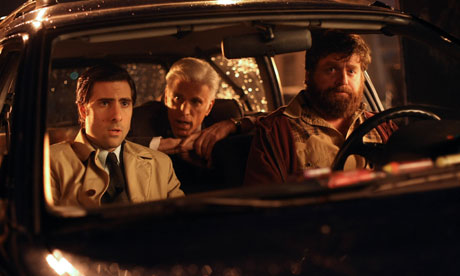

Movie Review: Crazy, Stupid, Love
Marketers and advertisers are supposed to fool us into believing that some product, usually an inferior one, is gold. Sometimes though, they fail to make a superior product look good. Point in case comes with “Crazy, Stupid, Love” a movie that perhaps no one knew how to sell, because it doesn’t at all try to be a part of the genre that everyone wants it to be in. But hey, sometimes lying is the only way to make a buck at the box office nowadays.
In a culture of showing everything and giving it all away, “Crazy, Stupid, Love” surprisingly surprised me, and it pulled off a surprising twist that could make even M. Night Shyamalan blush (is that joke still relevant?). “Crazy, Stupid, Love” has something most comedies could use these days: fully-formed characters. The movie starts off as with Cal Weaver (Steve Carell) and wife Emily (Julianne Moore) out at a restaurant. He asks what they could share for dessert, and the first thing she blurts out is ‘divorce.’
Before any of this is even said, it is already clear what is wrong with this marriage. Cal wears a distinctly beat up pair of white New Balance shoes, and typical rectangular glasses made simply to help him read, and not at all to distinguish him from any other man his age. He has been so lost in his marriage that he just lives to function. So little fight is left in him that when Emily wants to talk about things on the ride home, he simply opens the car door and jumps out in the middle of the road. What he barely got a chance to hear about was that Emily cheated on him with her boss (Kevin Bacon, in a subtletly sleazy role).
Following the divorce, Cal lives a sad sack life, and frequents a hip bar that seems too trendy for someone who doesn’t even know what a trend is. Meet Jacob (Ryan Gosling) who is basically a walking male fashion trend. Jacob is smooth in every sense, and can even casually drop some Yiddish into conversation. Jacob leaves the bar every night with a new woman until one day when he decides to drop everything and take Cal under his wing.
Jacob’s idea of changing one’s life around is a complete change in wardrobe. After disposing his New Balances and throwing on a new suit, Cal becomes Jacob’s clone. This leads him to picking up a series of women, one of them being a teacher (Marisa Tomei) who is just as self-loathing as he is. All the while, Cal’s family makes some other stupid mistakes, and his son Robbie (Jonah Bobo) tries to figure out what love is amongst the madness of divorce.
“Crazy, Stupid, Love” works not because it is the kind of romantic movie in which we are forced to root for a bunch of bad people who one day decide to do something good, but rather it is about a bunch of genuinely good people who sometimes act against their better judgement. Cal and Emily’s divorce made me think of “Kramer vs. Kramer” in its honesty and its ability to not pass down judgement onto its characters. Just as it occurs in reality, every action and every reaction has a purpose in the eyes of each person who carries it out. It has a bit of the he-said she-said mentality, but the movie is really about how their broken love affects a wide range of people, and not just the two of them.
I have been a fan of Steve Carell, since his days as a correspondent of “The Daily Show.” He can make anyone fall in love with even the goofiest characters (Michael Scott, Andy from “The 40-Year-Old Virgin”), but he’s never displayed the kind of range he shows in “Crazy, Stupid, Love.” In past roles was he had to make an unsympathetic character sympathetic and here, he has to do the exact opposite. He excels at this challenge and shows some dramatic chops he’s been hiding. Gosling meanwhile, has more dialogue than he had in both “Drive” and “The Ides of March” combined, yet he displays that same ability to play someone who is almost like a blank slate with one defining quality (driving, political knowledge, and here, clothes). He is described at one point as looking “photoshopped” and indeed, he makes Jacob look photoshopped. His transition into relationship man is surprisingly believable, with an extra thanks to Emma Stone, who’s importance to the story has a drastic change towards the movie’s end.
“Crazy, Stupid, Love” is the kind of funny that’s quiet and smooth, with each joke not attempting to be a gag but rather just a part of what anyone in the cast would say or do. The surprisingly refreshing script from Dan Fogelman (“Fred Claus”) gives every single character in the ensemble a purpose. Here is a movie that throws away the idea of throwaway characters and subplots. The movie’s only real flaw is a graduation scene final speech that feels a little too calculated, and while the happy ending feels earned, it ties things together too simply, especially with the cynical tone the movie carried throughout. Then again, for everything the characters went through and how they eventually prove themselves to the audience, maybe they deserved this conclusion.
“Crazy, Stupid, Love” made a mockery of the people who released it, proving that a poorly chosen title and some ads that seem to give away everything don’t necessarily rightfully represent the movie. Watching it made me think of a slightly lighter version of “The Descendents.” Like that other movie, there was a rare, genuine feeling behind the humor of “Crazy, Stupid, Love” that didn’t make me feel stupid for enjoying it, and certainly doesn’t make me feel crazy for endorsing it.
Movie Review: Hugo
 Even this late in his career, Martin Scorsese can still reinvent himself, even if it means not changing at all.
Even this late in his career, Martin Scorsese can still reinvent himself, even if it means not changing at all.




Movie Review: The Muppets
 It’s a testament to the enduring legacy of The Muppets that their latest film, aptly titled “The Muppets,”can open with Paul Simon’s “Me and Julio Down by the Schoolyard,” and make most of the audience giddy. Before the movie began, there was a trailer for the latest “Alvin and the Chipmunks” movie which involved the chipmunks singing and dancing to Lady Gaga’s “Bad Romance.” It’s things like these that make me thankful that The Muppets are back.
It’s a testament to the enduring legacy of The Muppets that their latest film, aptly titled “The Muppets,”can open with Paul Simon’s “Me and Julio Down by the Schoolyard,” and make most of the audience giddy. Before the movie began, there was a trailer for the latest “Alvin and the Chipmunks” movie which involved the chipmunks singing and dancing to Lady Gaga’s “Bad Romance.” It’s things like these that make me thankful that The Muppets are back.
What Your Thanksgiving TV Watching Says About You
Arrested Development Marathon (IFC)
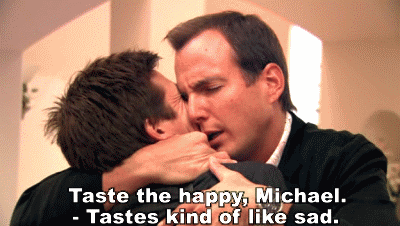
Movie Review: Moneyball
 Does every sports movie have to end with a victory in order to inspire us? If “Moneyball” teaches us anything, it’s that a failure is just one small step on the road to success.
Does every sports movie have to end with a victory in order to inspire us? If “Moneyball” teaches us anything, it’s that a failure is just one small step on the road to success.





